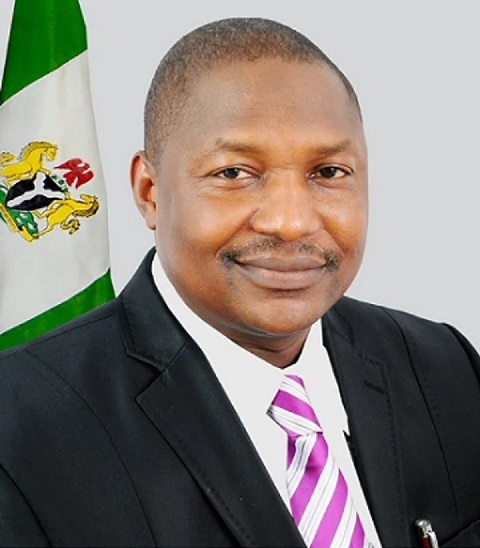COVER
Eid-el-Kabir: Muslims Face Low-key Celebration

By Gom Mirian, Abuja , Joseph Amedu, Lokoja; Jude Dangwam, Jos and Dan Amasingha, Minna
Ahead of Eid-el-Kabir celebration from tomorrow, prices of rams have risen beyond the reach of low income earners in Kogi state.
Our correspondent, who went round major markets, reports that an average ram presently sold for between N50,000 and N60,000 with the highest costing N200,000 to N250,000.
A ram seller, Mallam Bala Mai Riga, at the Ram market, near Banda, few kilometres away from Lokoja, who spoke with our reporter, expressed the optimism that prices were likely to rise beyond what is obtained at the weekend.
Reacting to the development, a Lokoja based Islamic Cleric, Yahaya Salihu advised Muslims to only use their legitimate means to buy ram for Eid-el-Kabir sacrifice.
Sheik Salihu, who is also the Chief Imam of a Jumma’at Mosques, warned Muslims against using ill-gotten money for the purchase of ram for sacrifice, noting that the Almighty Allah is pure and would accept only that which is clean and pure.
Sheik Salihu also admonished Muslims to have good intention for the sacrifice because it was a prerequisite to achieving acceptable sacrifice.
He explained that the act of slaughtering animal as sacrifice was a tradition that was highly encouraged among Muslims, which was performed on the 10th of Zul-Hijjah and the following three days.
“It is an essential religious rite in memory of the sacrifice performed by Prophet Ibrahim.
“It involves the slaughtering of domestic animal (sheep, goat, cow or camel) and offering it as a sacrifice during these days of Sallah celebrations,” he said.
He enjoined Muslims to ensure that the animal to be sacrificed had reached the required age, adding a minimum of six months for a sheep, one year for a goat, two years for cow and five years for camel.
Jos Camel Market Booms as Cost of Rams Increases
As Muslims prepare for the Sallah festival from tomorrow, prices of ram in Plateau state have increased tremendously out of the reach of th common man.
A visit to Kasuwan Shanu Nasarawa Gwom market in Jos North Local Government Area yesterday, showed scanty animals on display for sell.
The Secretary General of Livestock Sellers Association in Jos North LGA, Mr. Muhammadu Rabiu Aminu, while speaking to DAILY ASSET at the Yan Shanu Market said the lingering conflict between farmers and herders has contributed immensely to the poor supply of animals in the market and the high cost at the animals at the same time.
“The market is moving at a slow pace due to the current economic situation in the country. Aside that, there some challenges that are responsible for the high in price of animals, things like the conflicts between farmers and herders, the cost of food to feed these animals also is another factor because until crops and planted and harvested before the animals will also get and eat, these has affected the cost of animals this time around.
“Like sheep that were bought at the cost of 30,000 last year we now bought them at 40,000, those we sold at 50,000 are now sold at 60,000 and also sheep that were sold at 90,000 last year are now sold at 110,000”, Aminu said.
Aminu lamented that the market usually houses over 10,000 sheep during Sallah season, but only had about 4,000 sheeps that enter the market this year due to the lingering conflict and kidnapping.
“Because those who often buy the animals here are also afraid of the roads due to the problem of kidnapping,” Aminu added.
He disclosed that the little sales recorded was from Lagos customers who came and bought so many animals more than the people in Jos.
“We made some sales because of Lagos people, they came and bought plenty animals here even more than the people in Jos. We are calling on both the Federal and State Governor here to pay workers so that people can patronize us and celebrate the festivity.”
For a buyer like Alhaji Aminu Sale, the high cost of things has left both the sellers and the buyers in tears. For him, if the market failed to come down by Monday, so many people may not be able to celebrate the Sallah festival with or without slaughtering any animal.
“In fact any cow you bought last year at the cost of 100,000 naira is now 150,000 to 170,000, there are cow that were sold at 150,000 last year but is now 200,000 to 250,000.”
A seller, Auwel Yusuf said inspired the hike in price of animals ahead of the Sallah festival, they still make some little profits to keep body and soul moving.
“For example if you buy a cow at 60,000, by the next market you will see that an addition of 10,000 has been made and that has been the way the market is in recent times,” Sale said.
Meanwhile DAILY ASSET came across a Camel dealer Mr. Nasiru Abdullahi Babanjoda who said Camel market is now a booming venture and has made good sales as a result of aware nesses on the celebration of Sallah with Camel is on the rise.
He said some Camel goes for 500,000, some 300,000 some 200,000 there are those that also goes for 700,000 and Muslim faithful are buying them, adding that the rapid acceptance of using a Camel for sacrifice during Sallah is as a result of the numerous medicinal benefits of camel meat to human health.
“Everything you see from Camel is medicinal in nature as stated by traditional doctors some English medical doctors who have been creating awareness on the important of consuming Camel meat to our people.
“Just one litter of the Camel milk is sold at 2000 naira, and it handles sickness like high blood pressure, diabetes, amongst other illnesses. Even the urine of Camel goes for 500 to 1000 a bottle of Swan water, the shit are been counted fifty, fifty naira per shit so people have come to realize that Camel meat is a medicine and that is why they kept trooping-in to buy them”, Babanjoda said.
Niger Politicians Buy Rams at Night
In Niger State, high profile politicians may not have been exempted from economic meltdown as they embark on a bizarre act of buying rams at night in designated ram market to avoid the prying eyes of supporters.
DAILY ASSET gathered that the crafty measures adopted by some politicians may have been informed by the pressure been mounted on some of them by their supporters who sees the “gift of Sallah ram” as a routine political religious ritual.
Investigation reveals that, most politicians in the State are now caught between servicing their political foot soldiers and going under financially as the number of those seeking support increases.
Sources also confided to DAILY ASSET Correspondent that the large number of people seeking for “ram’ may not be unconnected with the inability of the state government to pay July salaries before the Eid Kabir festival even as most local government workers were yet to be paid since June.
A visit by DAILY ASSET to the Dutse Kuta Gwari Ram market on Friday and Saturday night to ascertain the trend by politicians in the state showed that some highly place politicians sneaked into the market in darkness to procure the number of rams they required.
Speaking on condition of anonymity, a member of the State House of Assembly admitted that as much as they would have loved to share, the exorbitant cost the animals which he said ranges from N50, 000 to N120,000 makes it near impossible to satisfy most supporters.
“What I do is in order not to offend my supporters; I decided to quietly buy my ram this time to avoid attracting attention
“Even though there is no way I will still not buy for my Village and District head along with some party leaders at my Ward and local government area”, he said.
…Taraba State too
Taraba residents may be forced to have a small celebration of the Eid el-Kabir slated for Tuesday and Wednesday over the high costs of foodstuff and rams.
A visit to most of the markets and shops spread across the state by our correspondent, revealed a sudden increase in the prices of goods.
Saddened by the development, respondents said that the situation would have been contained had the state government paid civil servants’ salaries.
“Although we are very much aware that the month has not yet come to an end, in the spirit of the celebration, we expected our government to at least follow the footsteps of some of the state governments by paying us our July salaries,” said Abba Sani.
Piqued that lack of payment of salaries would go a long way to prevent him and some of his friends from celebrating as expected, the situation, as stated by him, “is not funny at”.
“Would you believe that up till this moment I am talking with you, I have not done any single shopping for my family?”
Sani, who claimed not to be perturbed with what his children would wear on the day, said “my main concern now is the food I am expected to put on the table for my family and friends that will come visiting.”
Other respondents also echoed Sani’s comment.
Traders, who spoke to our correspondent, blamed suppliers for the hike.
According to Alhaji Danjuma Umar, a dealer in fabric materials, “It is not our joy that the prices of our goods have gone higher.”
Citing how their suppliers have suddenly catapulted the prices of goods to the peak, “the dream of every business man” as made known by him “is to make gain, so the only option left for us is to add something little on them.”
At the various ram markets also visited, our correspondent noticed that the prices are also above the reach of majority of intending buyers.
Traders, buyers lament high cost of Ram in Ibadan
With Eid-el-Kabir celebrations coming up tomorrow, some traders and buyers in Ibadan have expressed concern over high cost of rams, foodstuffs and other commodities and services.
A survey carried out by the News Agency of Nigeria (NAN) in some markets in Ibadan on Sunday revealed that all the respondents were bothered by the unstable nature of prices of goods and services.
Price checks at ram markets in New Ife Road, Egbeda, Adegbayi and Alakia areas of Ibadan showed that an average-sized ram, which sold for N40,000 in 2020, now cost between N60,000 and N65,000.
It was also observed that a big-sized ram sold for between N80,000 and N120,000.
At Aleshinloye market, rams cost between N30,000 and N110,000, a price range which Mallam Abdullahi Hashim, a ram seller, considered to be exorbitant.
Hashim told NAN that the high price was due to the security condition in the northern part of the country as well as high cost of transportation.
Similarly, another ram seller, Mr Ibrahim Jamiu, blamed transporters bringing the rams from the north for charging exorbitant fares.
Jamiu added, “even the prices of rams we rear here are high, because their feeds are costly too.
“We are only appealing to government to let its economic policies allow businesses to grow.”
Alhaji Abdulazeez Adeleke, who bought a ram for N63,000 at Adegbayi, also lamented its high price and those of other items.
According to him, the high cost of rams, food items and other consumables might not allow many families to celebrate the Salah as they would have loved to.
Another ram buyer, AbdulRashid Jimoh, said although rams were very much available, the prices were out of reach.
He, however, said that he could not but buy for his parents, no matter the cost.
In his opinion, Mr Sanusi Hassan, a ram buyer at Aleshinloye market, linked the scarcity and high cost of the animal with the cancellation of the 2021 hajj pilgrimage by Saudi Arabian Government.
This, he said, had created room for more Muslim faithful, who would have celebrated Salah in Saudi Arabia, to be at home for the festival.
Mr Morufu Sani, an intending ram buyer at Ojo-Oba market, regrettably said he could not afford to buy a ram due to its high cost.
“A big ram of my choice is sold for N140,000. Where do I get such money? Any meat we see, no matter how small, my family and I will manage it,” he said.
However, a rice seller at Oja-Oba market, Alhaja Olugbade Salami, said that prices of all foodstuffs, including rice, had increased even before the onset of the festive period.
“A bag of rice that we used to sell at below N20,000 is now sold for N26,000 and it is quite unfortunate that there’s no patronage now like before,” she said.
Meanwhile, Mrs Bisola Salawu, an onion seller, said that buyers were no longer buying in bulk due to the hike in price of the item.
“Forty pieces of onion that we used sell for N2,000 before now sell for N2,500, and you will hardly see people buying in bulk as they used to,” she said.
As for tomatoes, a seller, Mrs Kawa Aminat, told NAN that a bucket of tomatoes, which sold for N800 in 2020, now sold for between N1,500 and N2,000.
“Almost all the prices of commodities brought from the North have gone up due to COVID-19 issues, transportation cost and farmers/herders’ crises.
For instance, six pieces of yam that used to sell for N4,500 now went for N6,000, resulting in reduced patronage,” she said.
Secretary, Arewa Pepper Sellers Association of Oyo State, Mallam Illiasu Bala, also said that Tatashe (Bell pepper) and Bawa (Sombo), which formerly sold at N7,000 per bag, had each increased to N20,000 per bag.
Also, Chairman, Oyo State Onion Sellers’ Association, Alhaji Azeez Ademola, who explained that onion was not in season, said that a small bag of onions was now N20,000, while the big bag was now N30,000.
A vegetable oil seller at Ojo-Oba market, who simply identified herself as Alhaja, said she had not sold anything since she opened her shop in the morning.
“A five-litre Kings Oil that was around N3,500 before is now sold for N5,000, and there’s no market. I have been sitting down like this since morning.
“Everywhere is dry. Whether Ileya or not, customers are not coming. Many people are even living on loans,” she said.
NAN, however, reports that prices of textile materials at Gbagi textile market remained stable, with 12 yards of locally-made Ankara fabric selling for between N3,000 and N7,000, depending on the quality.
However, a textile dealer, Mrs Aliratu Lasisi, complained of low patronage, attributing it to the poor economic situation of the country.
She observed that people were now more concerned about what to eat than what to wear.
Her submission was affirmed by operators in the fashion industry, as some tailors and fashion designers said there had been sharp decline in patronage, in spite of the Sallah that was fast approaching.
A tailor, Mr Saliu Ojedele, said, “Gone are days when we used to hire more hands to work night shifts in order to meet up with customers’ demands.
“Ordinarily, we ought to have started doing that, but it’s quite different now.”
A customer, Mr Abdullahi Wasiu, however, said that he was more particular about getting his children clothes to make them happy and comfortable in the midst of their peers and extended family members.
“For adults, you can wear whatever you have, especially if there are no means of buying new dresses. Aside that, getting ram is more important than buying new dresses,” he said.
Contrarily, a jeweler, Miss Nkechi Emeka, said that the soaring prices of consumer goods and services had not dampened people’s morale towards shopping.
“I will not say people are not buying like before. Yes, the percentage of those who usually visit markets during festive periods has reduced, but sellers are also not able to meet the demands.
“This is because of the increase in dollar rate and some of us did not have enough money to stock up before this week.
“Some sellers have even run out of goods because they didn’t get enough money to buy before this period,” she said.
Corroborating Emeka, a clothe vendor, described the rising prices of goods as an unfavourable trend for both buyers and small business owners.
“What some of us did to prepare for the demands of this season was to form groups. We contributed money to buy in bulk; we then split the goods for sale.
“However, the amount that we used to spend on purchasing 10 cartons is now what we use to buy one or two cartons.
“The prices are even unstable. What you buy today at N50,000 may go up to N55,000 within a week.
“The economy is really biting hard and the unstable prices have forced some of our colleagues to shut down,” she said.
A buyer, Mrs Mojo Daramola, who was at the market to shop for the festive period, lamented what she described as “outrageous prices”.
Daramola, who appealed to government to urgently intervene in driving down the prices of goods and services, said she was left with the option of buying fewer items, which mostly included her children’s clothes.
COVER
DAILY ASSET Appoints Torough, Editor, Names Eze, Deputy

By Laide Akinboade, Abuja
As part of efforts to reposition the newspaper for optimum corporate performance, the management of Asset Newspapers Limited, Publishers of DAILY ASSET, has announced the appointment of David Torough as the Editor of the Abuja-based national daily.
A statement by the management said the appointments were part of the company’s new strategy to further penetrate the various states in the country and raise its readership and patronage.
“DAILY ASSET is widely acceptable across the country and to maintain our leadership position, we need to increase management presence, hence the need to create new Bureau offices in some locations outside Abuja and Lagos,” the statement quoted the Publisher/ Editor-in-Chief, Dr Cletus Akwaya to have said.
In a statement yesterday, Publisher and Editor-in-Chief of the fast-growing daily, Dr. Cletus Akwaya said the appointment was part of the new strategy to properly situate the paper for better productivity.
“DAILY ASSET has a commitment with the Nigerian people. We are determined to weather the storm and give Nigerian readers a Newspaper that satisfies their yearnings and reading pleasure and we can only do that with the right set of professionals,” the statement said.
Akwaya, a former Commissioner of Information from Benue State said the difficult times being faced by Nigerians posed a great challenge to the media as the people deserved credible information with which to make choices.
“We have a bond with the people, to offer credible information at all times in the best tradition of the Nigerian Press and on this scale of objectivity, truth and fairness, we pledge to remain steadfast no matter the challenges,” Akwaya was quoted to have said.
He said the newspaper will maiantin its daily print run and circulation to all states of the federation and urged advertisers to take advantage of the deep penetration of the Daily Asset brand to send their messages.
Torough, the new Editor has had a steady rise in the Newspaper in the last five years.
A graduate of Mass communication of the Benue State University, Makurdi, Torough joined the company in 2022 as Benue State Correspondent. He was spotted for his brilliance and redeployed to Abuja the following year and promoted to Deputy News Editor. He was subswuently named Deputy Editor of the paper, a position he held until the recent appointment.
Torough has attended several journalistic workshops and trainings to properly equip himself for the task ahead.
The statement also said the Management named Eze Okechukwu as Deputy Editor.
Before his elevation as Deputy Editor, Eze has been Deputy Politics Editor and DAILY ASSET Newspaper correspondent covering the Senate, having joined the organization in 2021.
Born on March 10, 1975, Eze holds a Masters Degree in Mass Communication from the Enugu State University of Science and Technology.
Eze began his journalism career with Daily Star, Enugu and later worked with Daily Trust Newspaper, Abuja as sports reporter.
Aside from his journalistic excellence, he has a great deal of passion for sports.
COVER
Insecurity: Northern Govs, Monarchs Seek Six-month Mining Suspension

From Ngutor Dekera, Kaduna and Aliyu Askira, Kano
Northern governors and traditional rulers yesterday called for the suspension of mining activities across the region for six months, blaming illegal mining for worsening insecurity in many states.The resolution was contained in a communiqué issued after a joint meeting of the Northern States Governors’ Forum and the Northern Traditional Rulers’ Council held at the Sir Kashim Ibrahim House, Kaduna.
The meeting, chaired by the Gombe State Governor and NSGF Chairman, Muhammadu Yahaya, had in attendance the 19 northern governors and chairmen of the 19 states’ traditional councils. The Forum expressed concern over the escalating violence in parts of the North, including the killings and abductions recently recorded in Kebbi, Kwara, Kogi, Niger, Sokoto, Jigawa and Kano states, as well as renewed Boko Haram attacks in Borno and Yobe.“The Forum extends its deepest condolences and solidarity to the governments and good people of the affected states,” the communiqué said, noting that the attacks on schoolchildren and other citizens had become “unacceptable tragedies” that required urgent collective action.It commended President Bola Tinubu for what it described as the Federal Government’s “firm response” to recent abductions and insurgency threats, especially the rescue of some abducted pupils.The governors also saluted security agencies for their sacrifices on the frontlines.“We resolved to renew our support for every step taken by the President and Commander-in-Chief to take the fight to insurgents’ enclaves in order to end the criminality,” the Forum stated.A major highlight of the meeting was the North’s renewed push for the establishment of state police, with governors and traditional rulers insisting that decentralised policing had become inevitable.“The Forum reaffirms its wholehearted support and commitment to the establishment of state police,” the communiqué added, urging federal and state lawmakers from the region to “expedite action for its actualisation.”On illegal mining, the governors said criminal mining networks were fuelling violence and providing resources for armed groups.As a corrective measure, they asked Tinubu to direct the Minister of Solid Minerals to impose a six-month suspension of mining activities in order to allow for a full audit and revalidation of licences.“The Forum observed that illegal mining has become a major contributory factor to the security crises in Northern Nigeria. “We strongly recommend a suspension of mining exploration for six months to allow proper audit and to arrest the menace of artisanal illegal mining,” it said.To strengthen the fight against insecurity, the governors also announced the creation of a regional Security Trust Fund.Under the proposed arrangement, each state and its local governments will contribute ₦1bn monthly, to be deducted at source under an agreed framework.They said the fund would help provide sustainable financing for joint operations, intelligence-driven interventions and coordinated security responses across the region.At the end of the meeting, the Forum reaffirmed its commitment to unity and collective responsibility.“Only through unity, peer review and cooperation can we overcome the pressing challenges before us,” it declared.The Forum agreed to reconvene on a date to be announced.Meanwhile, Nigeria’s worsening security crisis took a grim turn on Monday as bandits launched fresh attacks in Kano State, abducting 25 villagers, even as the Federal Government raced to secure the release of more than 300 Catholic school children kidnapped in Niger State.In the early hours of Monday, armed bandits invaded Unguwar Tsamiya—popularly called Dabawa—in Shanono Local Government Area of Kano State, whisking away nine men and two women after shooting into the air and assaulting residents. The attackers also rustled two cows.A resident lamented the community’s helplessness: “We cannot do otherwise; most of us cannot leave because we have nowhere to go. This is our place, our land and everything is here.”The assault came less than 24 hours after a similar attack on Yan Kamaye in Tsanyawa LGA, a community along the volatile Katsina border.In Niger State, National Security Adviser Nuhu Ribadu has assured distraught families of St. Mary’s Co-Education School, Kontagora that the more than 300 students and staff abducted on November 21 will return home “soon.” Ribadu, who led a high-level federal delegation to the school on Monday, said the abductees are safe, though he offered no specifics on their location or the status of rescue operations.According to Daniel Atori, spokesman for the Catholic bishop overseeing the school, the NSA reassured officials: “The children are where they are and will come back safely.”The St. Mary’s attack is part of a worrying resurgence of mass kidnappings reminiscent of the 2014 Chibok schoolgirls’ abduction. Security analysts warn that banditry has evolved into a “structured, profit-seeking industry,” with hundreds of Nigerians abducted in November alone.The Kontagora school abduction occurred the same week 25 girls were kidnapped in Kebbi State—victims who authorities say have since been rescued through “non-kinetic” means. About 50 of the St. Mary’s hostages have also managed to escape.Ribadu’s delegation, which included the Minister of Humanitarian Affairs and the Director-General of the Department of State Services (DSS), reaffirmed the government’s commitment to securing the freedom of all abducted citizens.As communities from Kano to Niger continue to bear the brunt of these violent incursions, the escalating spate of kidnappings underscores the urgent national demand for a more decisive and coordinated security response.COVER
Abacha Loot Probe: Malami Faces EFCC Panel Daily in December

By David Torough, Abuja
The Economic and Financial Crimes Commission (EFCC) said former Attorney‑General of the Federation and Minister of Justice, Abubakar Malami, will face a team of interrogators at its office daily throughout December.A credible source in the EFCC said on Monday that the daily appearance was part of an ongoing investigation into the whereabouts of an alleged 490 million dollars Abacha loot secured through a Mutual Legal Assistance (MLAT) request.
The source said that Malami, who was summoned for interrogation by the EFCC on Saturday, was barred from leaving Nigeria for the next one month.According to the source, one of the conditions for his release on Saturday was that he should report daily to the EFCC Headquarters in Abuja for further interrogation.The source said Malami would have to appear daily at the anti-graft office due to the volume of the investigation and the seriousness of the charges against him.”We seized his passport, it is the normal routine during investigation, but he has to report at the EFCC headquarters in Abuja every day for the next month.”He will be reporting for further investigation throughout December.”He will be reporting every day, starting from Dec. 1st to Dec. 31st.He will appear before the team of investigators for the entire month of December.”He will be reporting to EFCC for investigation for the period because of the volume of the investigation and the seriousness of the charges against him,” the source added.According to the source, a fact sheet on the former minister revealed that Malami had several issues to clarify with the EFCC within the coming weeks.“We have asked him to explain the whereabouts of the $490 million Abacha loot secured through MLAT.“We didn’t say he stole money, but he should account for the loot. This is one of the issues he will clarify to our investigators.”The commission cited the large volume of documents he must review and the need for extensive interviews as reasons for seizing his passport.The source said EFCC would not engage in a war of words but would release its findings after a thorough investigation.Malami, in a statement by his media aide, Mohammed Doka, on Monday in Abuja, however, described the EFCC investigation as a political witch‑hunt.He confirmed he honored an EFCC invitation on Nov. 28, describing the engagement as fruitful and expressing confidence that the probe would vindicate him.Malami described the EFCC’s allegations as baseless, illogical and devoid of substance, insisting they collapse under factual scrutiny.





























